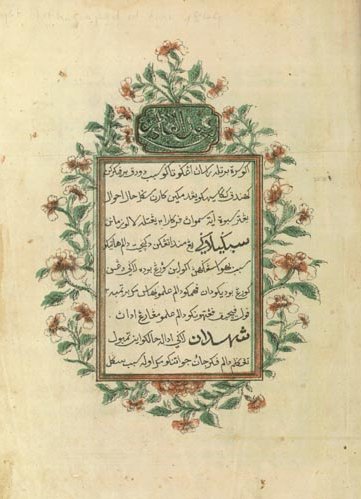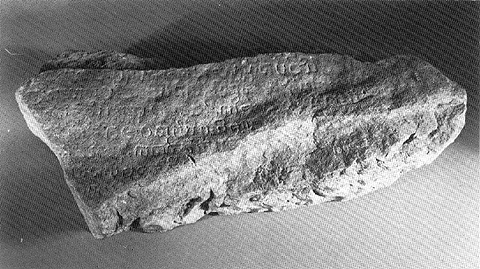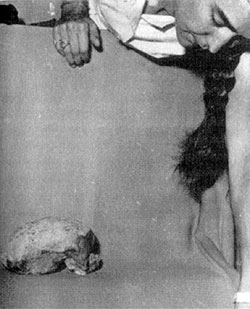|
Hikayat Abdullah
Hikayat Abdullah (حكاية عبدالله) is a major literary work by Abdullah bin Abdul Kadir, a Malacca-born Munshi of Singapore. It was completed in 1845 and first published in 1849, making it one of the first Malay literary texts to be published commercially. Abdullah's authorship was prominently displayed in this text and the contents were conveyed in simple, contemporary Malay. Unlike typical classical Malay literary works that contain mythical and legendary stories, Abdullah's work dealt with social realism. The work has been described as Abdullah's autobiography, and contains his personal but perceptive view of Singapore and Malaccan society at the beginning of the 19th century. It provides a glimpse of his early childhood in Malacca, including an operation performed upon him by an English surgeon, his visit to an encampment of the Tiandihui, a Chinese secret society in the interior of Singapore, and events such as the founding of Singapore Institution, the demolition ... [...More Info...] [...Related Items...] OR: [Wikipedia] [Google] [Baidu] |
Johor Sultanate
The Johor Sultanate ( ms, Kesultanan Johor or ; also called the Sultanate of Johor, Johor-Pahang, or the Johor Empire) was founded by Malaccan Sultan Mahmud Shah's son, Sultan Alauddin Riayat Shah II in 1528. Johor was part of the Malaccan Sultanate before the Portuguese conquered Malacca's capital in 1511. At its height, the sultanate controlled modern-day Johor, Pahang, Terengganu, and territories stretching from the river Klang to the Linggi and Tanjung Tuan, Muar, Batu Pahat, Singapore, Pulau Tinggi and other islands off the east coast of the Malay peninsula, the Karimun islands, the islands of Bintan, Bulang, Lingga and Bunguran, and Bengkalis, Kampar and Siak in Sumatra. During the colonial era, the mainland part was administered by the British, and the insular part by the Dutch, thus breaking up the sultanate into Johor and Riau. In 1946, the British section became part of the Malayan Union. Two years later, it joined the Federation of Malaya and subsequently ... [...More Info...] [...Related Items...] OR: [Wikipedia] [Google] [Baidu] |
History Of Singapore
The history of the modern state of Singapore dates back to its founding in the early nineteenth century; however, evidence suggests that a significant trading settlement existed on the Singapore Island, Island of Singapore in the 14th century. The last ruler of the Kingdom of Singapura, Parameswara (sultan), Parameswara, was expelled by the Majapahit or the Ayutthaya Kingdom, Siamese and he then founded Malacca Sultanate, Malacca. Singapore then came under the Malacca Sultanate and then the Johor Sultanate. In 1819, British statesman Stamford Raffles negotiated a treaty whereby Johor allowed the British to locate a trading port on the island, ultimately leading to the establishment of the Founding of modern Singapore, crown colony of Singapore in 1867. Important reasons for the rise of Singapore were its nodal position at the tip of the Malay Peninsula flanked by the Pacific and Indian Oceans, the presence of a natural sheltered harbour, as well as its status as a free port. Du ... [...More Info...] [...Related Items...] OR: [Wikipedia] [Google] [Baidu] |
History Of Malaysia
Malaysia is located on a strategic sea lane that exposes it to global trade and various cultures. The name "Malaysia" is a modern concept, created in the second half of the 20th century. However, contemporary Malaysia regards the entire history of Malaya and Borneo, spanning thousands of years back to prehistoric times, as its own history. An early western account of the area is seen in Ptolemy's book ''Geographia'', which mentions a " Golden Khersonese," now identified as the Malay Peninsula. Hinduism and Buddhism from India and China dominated early regional history, reaching their peak during the reign of the Palembang, Sumatra, Indonesia - based Srivijaya civilisation, whose influence extended through Sumatra, West Java, East Borneo and the Malay Peninsula from the 7th to the 13th centuries. Although Muslims passed through the Malay Peninsula as early as the 10th century, it was not until the 14th century that Islam first firmly established itself. The adoption of Islam in ... [...More Info...] [...Related Items...] OR: [Wikipedia] [Google] [Baidu] |
19th-century Manuscripts
The 19th (nineteenth) century began on 1 January 1801 ( MDCCCI), and ended on 31 December 1900 ( MCM). The 19th century was the ninth century of the 2nd millennium. The 19th century was characterized by vast social upheaval. Slavery was abolished in much of Europe and the Americas. The First Industrial Revolution, though it began in the late 18th century, expanding beyond its British homeland for the first time during this century, particularly remaking the economies and societies of the Low Countries, the Rhineland, Northern Italy, and the Northeastern United States. A few decades later, the Second Industrial Revolution led to ever more massive urbanization and much higher levels of productivity, profit, and prosperity, a pattern that continued into the 20th century. The Islamic gunpowder empires fell into decline and European imperialism brought much of South Asia, Southeast Asia, and almost all of Africa under colonial rule. It was also marked by the collapse of the large S ... [...More Info...] [...Related Items...] OR: [Wikipedia] [Google] [Baidu] |
Jawi Manuscripts
Jawi may refer to: People and languages *Australia: **Jawi dialect, a nearly extinct Australian aboriginal language **Jawi people, an Australian Aboriginal people of the Kimberley coast of Western Australia, who speak or spoke the Jawi dialect *Asia: **Jawi alphabet, an Arabic script developed for writing Malay and other languages in Southeast Asia, today used in a limited capacity in areas of Indonesia and Malaysia **Jawi Peranakan, a community of Malay, South Asian, and Arab heritage concentrated in Penang and Singapore Places *Jawi, Penang, a town in the state of Penang, Malaysia *Jawi (woreda) Jawi ( Amharic: ጃዊ) is one of the woredas in the Amhara Region of Ethiopia. Part of the Agew Awi Zone, Jawi is bordered on the west by the Benishangul-Gumuz Region, on the north by Semien Gondar Zone, on the east by Mirab Gojjam Zone, and on t ..., a woreda or district in the Amhara Region of Ethiopia * Jawi temple, a 13th-century syncretic Hindu-Buddhist temple in East Java, Indo ... [...More Info...] [...Related Items...] OR: [Wikipedia] [Google] [Baidu] |
Malay-language Literature
Malay (; ms, Bahasa Melayu, links=no, Jawi: , Rencong: ) is an Austronesian language that is an official language of Brunei, Indonesia, Malaysia, and Singapore, and that is also spoken in East Timor and parts of the Philippines and Thailand. Altogether, it is spoken by 290 million people (around 260 million in Indonesia alone in its own literary standard named "Indonesian") across Maritime Southeast Asia. As the or ("national language") of several states, Standard Malay has various official names. In Malaysia, it is designated as either ("Malaysian Malay") or also ("Malay language"). In Singapore and Brunei, it is called ("Malay language"). In Indonesia, an autonomous normative variety called ("Indonesian language") is designated the ("unifying language" or lingua franca). However, in areas of Central to Southern Sumatra, where vernacular varieties of Malay are indigenous, Indonesians refer to the language as , and consider it to be one of their regional langua ... [...More Info...] [...Related Items...] OR: [Wikipedia] [Google] [Baidu] |
Internet Archive
The Internet Archive is an American digital library with the stated mission of "universal access to all knowledge". It provides free public access to collections of digitized materials, including websites, software applications/games, music, movies/videos, moving images, and millions of books. In addition to its archiving function, the Archive is an activist organization, advocating a free and open Internet. , the Internet Archive holds over 35 million books and texts, 8.5 million movies, videos and TV shows, 894 thousand software programs, 14 million audio files, 4.4 million images, 2.4 million TV clips, 241 thousand concerts, and over 734 billion web pages in the Wayback Machine. The Internet Archive allows the public to upload and download digital material to its data cluster, but the bulk of its data is collected automatically by its web crawlers, which work to preserve as much of the public web as possible. Its web archiving, web archive, the Wayback Machine, contains hu ... [...More Info...] [...Related Items...] OR: [Wikipedia] [Google] [Baidu] |
Anthony Burgess
John Anthony Burgess Wilson, (; 25 February 1917 – 22 November 1993), who published under the name Anthony Burgess, was an English writer and composer. Although Burgess was primarily a comic writer, his Utopian and dystopian fiction, dystopian satire ''A Clockwork Orange (novel), A Clockwork Orange'' remains his best-known novel. In 1971, it was adapted into a controversial A Clockwork Orange (film), film by Stanley Kubrick, which Burgess said was chiefly responsible for the popularity of the book. Burgess produced numerous other novels, including the Enderby quartet, and ''Earthly Powers''. He wrote librettos and screenplays, including the 1977 TV mini-series ''Jesus of Nazareth (miniseries), Jesus of Nazareth''. He worked as a literary critic for several publications, including ''The Observer'' and ''The Guardian'', and wrote studies of classic writers, notably James Joyce. A versatile linguist, Burgess lectured in phonetics, and translated ''Cyrano de Bergerac (play), ... [...More Info...] [...Related Items...] OR: [Wikipedia] [Google] [Baidu] |
Earthly Powers
''Earthly Powers'' is a panoramic saga novel of the 20th century by Anthony Burgess first published in 1980. It begins with the "outrageously provocative" first sentence: "It was the afternoon of my eighty-first birthday, and I was in bed with my catamite when Ali announced that the archbishop had come to see me." On one level it is a parody of a "blockbuster" novel, with the 81-year-old hero, Kenneth Toomey (allegedly loosely based on British author W. Somerset Maugham), telling the story of his life in 82 chapters. It "summed up the literary, social and moral history of the century with comic richness as well as encyclopedic knowingness", according to Malcolm Bradbury. The novel appeared on the shortlist for the Booker Prize in the year of its publication but lost out to William Golding's ''Rites of Passage''. In an October 2006 poll in ''The Observer'', it was named joint third for the best work of British and Commonwealth fiction of the last 25 years (along with Ian McEwan' ... [...More Info...] [...Related Items...] OR: [Wikipedia] [Google] [Baidu] |
Journal Of The Malaysian Branch Of The Royal Asiatic Society
The ''Journal of the Malaysian Branch of the Royal Asiatic Society'' (JMBRAS) is a scholarly journal published by the Malaysian Branch of the Royal Asiatic Society (MBRAS). The journal covers topics of historical interest concerning peninsular Malaysia, Sabah, Sarawak, Labuan and Singapore Singapore (), officially the Republic of Singapore, is a sovereign island country and city-state in maritime Southeast Asia. It lies about one degree of latitude () north of the equator, off the southern tip of the Malay Peninsula, bor .... It was founded in 1877 in Singapore. History The journal has been published under three different names during its 130-year history. The journal was first founded in 1877 by a group of British colonial administrators in Singapore, and published as the ''Journal of the Straits Branch of the Royal Asiatic Society'', abbreviated to JSBRAS, and published at six-monthly intervals by the Straits Branch of the Royal Asiatic Society (SBRAS). The firs ... [...More Info...] [...Related Items...] OR: [Wikipedia] [Google] [Baidu] |
William Shellabear
William Girdlestone Shellabear (1862–1947) was a "pioneer" scholar and missionary in British Malaya (today, part of Malaysia). He was known for both his appreciation of Muslim society and also his translation of the Bible into the Malay language.Vernon CorneliusWilliam G. Shellabear National Library Board (Singapore), eresources.nlb.gov.sg. Retrieved 4 April 2022. Life and career W. G. Shellabear, as he was generally known, was born at Holkham Hall on 7 August 1862 in Norfolk, England, where his father was estate manager. He first went to Malaya as a British soldier, then returned as a Methodist missionary, where he worked from 1891 to 1948. "He introduced and guided changes in attitudes towards Malays and Islam, which made it possible for Methodist missionaries to relate positively to Malays while maintaining the integrity of their evangelistic outreach." He helped Westerners appreciate "how Malay spirituality represented a genuine commitment to Islam, despite its failure t ... [...More Info...] [...Related Items...] OR: [Wikipedia] [Google] [Baidu] |







